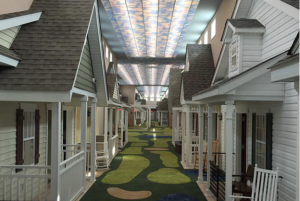There is a projected boom in facilities that provide specialized memory care to Alzheimer’s patients. While some facilities are stand-alone solutions for memory care patients, others will offer care that is already integrated into existing facilities that cover more than just the memory care sector. Lisa McCracken, senior vice president of senior living research and development at Ziegler says “With the projected increases in individuals who have cognitive impairments, and the decreasing number of caregivers, we do not expect that this pattern will go away anytime soon.”
Some of the fundamental changes include inventive care settings that are vastly different than existing dementia support floors and secure units. Some of the care settings have not yet been realized as research and understanding of cognitive impairment continues forward. The fact is there will be a broader array of options to choose from in the near future. The “small house” model is becoming increasingly popular. The small house model is an intimate setting within existing nursing communities consisting of 10 enclosed, secure units and is designed for couples facing memory challenges. A small-scale affordable housing model partially funded by the Department of Housing and Urban Development (HUD) is typically available to low-income seniors.
Those seniors who can afford private pay for their memory care are being aided by assisted living facilities that design dementia care units like a neighborhood from an earlier time in the patient’s life. Often, dementia patients readily recall memories from long ago, and these centers, designed to look like a community, are replete with porches, rocking chairs, carpet that mimics grass, and a fiber optic ceiling that allows transitional lighting creating a sense of the day and night sky. Other elements like aromatherapy can aid in calming residents or stimulating appetite depending on the selection of oils integrated into the therapy. All of these elements help reduce anger, anxiety, and depression which are hallmarks of seniors who suffer from dementia illnesses.

https://www.facebook.com/lanternofmadison/
Full continuum care is improving as it meets the increasing numbers of its resident base with memory care issues. Many facilities are tapping into the expertise of geriatric psychiatry
“… also known as geropsychiatry, psychogeriatrics or psychiatry of old age is a subspecialty of psychiatry dealing with the study, prevention, and treatment of mental disorders in humans with old age.” This field of study can enhance a memory care facility and improve the problems of anger, depression, and anxiety with medical components that address dementia. The techniques include a person-centered approach focusing on fostering autonomy, developing empathy with residents, and even focusing on humor to help alleviate stress and increase the quality of life.
Professional caregivers will receive a specialization in treating residents with dementia. Formal memory care education will become a more commonplace accreditation as the numbers of patients in need continue to increase. Rather than a certified nursing assistant (CNA) dementia patients will be tended to more frequently by certified dementia care nursing assistants (CDNAs). This change in credentialing will be driven by rising consumer expectations as well as tighter regulations that govern memory care.
Dementia illness is more prevalent than ever before, and so is the understanding that the disease has a long preclinical phase. Intervention and healthy lifestyle modification can continue to delay the onset of dementia in its clinical phase. Physical activity, social engagement, and brain fitness through smart devices and computer applications are wonderful cognitive compensation strategies that protect executive brain function, particularly in the preclinical phase of the disease. Beyond the known technology that already aids in the staving off of dementia, new cutting-edge work can also help seniors compensate for memory loss allowing them to remain at home longer as well as enable senior facility operators to refine their services.
Wearable cameras that have artificial intelligence (AI) facial recognition capabilities can provide a patient with the name of the person who is approaching them. AI can also help a senior’s cognitive load; helping them stay informed regarding day-to-day decisions. Newly developed website interfaces are making it easier for memory care patients to use and video, audio, and sensor technologies can help detect depression or alert, through predictive analytics, a patient having a bad day or an increased risk of falling due to a change in gait. The potential for technology applications in memory care is seemingly endless and there is more research and development in the works.
Do you or your loved one have a plan in place in the event you become a memory care patient? Are you aware of the changing options available for living arrangements? If you’d like to discuss your particular situation, please contact our Sherwood or Searcy office at 501-834-2070 to discuss how we can help you or your loved one.

